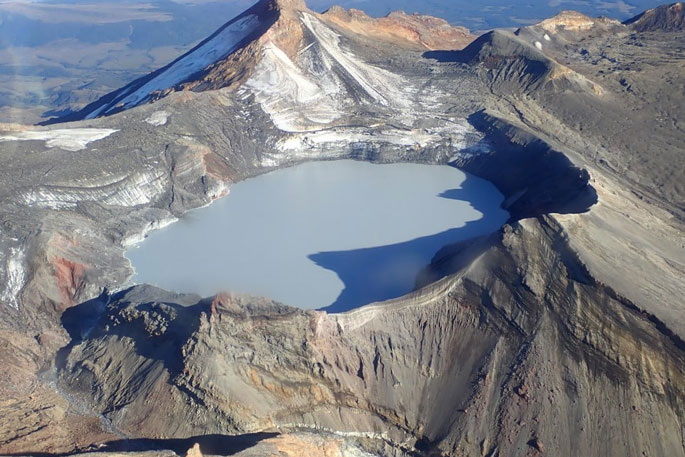Mt Ruapehu’s famous crater lake continues to run extraordinarily cool – but scientists watching the volcano remain confident a sudden eruption is unlikely.
Temperatures in the lake dropped to a record-low 6.83C last month and, as at last week, were measuring about 8C – well down on the 31C peak temperature observed in mid-February.
Scientists suspect the hydrothermal system beneath the lake atop the 2800m-high volcano is partially blocked.
Blockages preceded eruptions in 1981, 1988 and 2007 but, in most cases, a new heating cycle began without an event.
GNS Science volcanologist Brad Scott said rain and snow were factors in the current lower lake temperature, but also a reduced flow of heat from beneath, which indicated “some sealing” of vent areas in the system.
While the amount of sulphur dioxide volcanic gas passing through the lake had also dropped sharply since summer, observations indicated the system wasn’t completely blocked.
There had also been few tell-tale risk signals of eruption, with levels of gas emissions and volcanic tremor continuing to run low, and no notable changes in ground deformation.
“There remains no change in the monitored parameters and the sudden eruption scenario remains unlikely,” Scott said.
“That would change if there were signals of change at depth under the lake.
“Ruapehu is an active volcano and can have sudden onset eruptions with little warning.”
An eruption now would likely be a small one, but the area around the crater lake would be particularly hazardous: 2007′s quick-fire blast nearly killed a pair of climbers who were near the summit.
It wasn’t clear how long the lake’s cooling period would go on for, but Scott said it’d so far been seven months, and that heating and cooling cycles typically lasted nine to 15 months.
Ruapehu remained at Volcanic Alert Level 1, which indicated minor unrest.
Meanwhile, Scott said volcanic activity at Whakaari/White Island – currently at Volcanic Alert Level 3 – appeared to be declining.
Scientists have been observing bouts of unrest and small eruptions at the offshore Bay of Plenty volcano since August. At one point it threw out ash that disrupted a dozen flights to local airports.
While ash was still being detected occasionally – sometimes reaching 1km above the island – it’d now become “less constant and less vigorous”, Scott said.
“We may soon see the end of the current eruptive episode.”



1 comment
The Master
Posted on 07-10-2024 16:36 | By Ian Stevenson
Ruapehu is not "dead" it is merely asleep. The volcano will only cease to exist when either: - there is an alternate or subduction stops.
So as there is no or little heat getting to the surface, hence the lake is colder, would indicate that the heat source has stopped (unlikely) or is blocked (more likely). As a result, at some point that heat source will have to find a way out, the longer that takes the potential then is for significant consequence.
Leave a Comment
You must be logged in to make a comment.